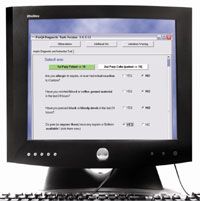 The National Academies of Emergency Dispatch® (NAED) has released an Aspirin Diagnostic and Instruction Tool in the Medical Priority Dispatch System® (MPDS) to help dispatchers determine when to advise the administration of aspirin and when not to.
The National Academies of Emergency Dispatch® (NAED) has released an Aspirin Diagnostic and Instruction Tool in the Medical Priority Dispatch System® (MPDS) to help dispatchers determine when to advise the administration of aspirin and when not to.
The NAED recommends using this life-saving tool whenever a patient reports chest pain or heart attack symptoms. Patients do not qualify for aspirin if they are not alert, if they are under 16 years old, if they are allergic or ever had a bad reaction to aspirin before, or if they currently suffer from any kind of internal bleeding.
“The ability of ‘pre’-pre-hospital personnel to provide aspirin by protocol to patients with acute coronary syndromes will markedly improve the consistency and timeliness of its administration,” said Paul Stiegler, M.D., FACEP, Medical Director Dane County (Wis.) Emergency Medical Services.
According to Jeff Clawson, MD, inventor of the MPDS and co-founder of the NAED, even in the best EMS systems where aspirin administration is allowed at scene, 10 percent to 30 percent of eligible chest pain patients are not given aspirin. “Since the Academy takes a unified multi-country view of dispatch-provided patient care, even a small percentage of increase in the proper administration of aspirin could affect thousands of at-risk people,” he said. “Because EMDs using the MPDS follow a structured protocol, the subjective nature of administration is minimized and patients get it whenever possible and appropriate. Every system and medical director doesn’t have to re-invent the aspirin wheel.”
Aspirin, or acetylsalicylic acid (ASA), helps improve blood flow to the heart in patients experiencing any acute coronary syndrome, including unstable angina and acute myocardial infarction (AMI)—or, in the layman’s terms, chest pain and heart attack. Although aspirin does not act as a blood thinner like warfarin, it essentially “greases” the platelets, allowing blood to flow more freely. This can pose a danger to patients with internal bleeding problems such as bleeding ulcers. Taking aspirin is not recommended for such patients.
Experts in the NAED’s Council of Standards and College of Fellows recognize that a few patients who qualify for aspirin based on the diagnostic tool may still experience adverse effects from aspirin administration. However, because of the high risk of patient death in AMI situations, the early administration of aspirin benefits more patients than it may compromise. Each dispatch agency’s medical control structure must approve the Aspirin Diagnostic before it can be used in the call center.
The NAED is a nonprofit standard-setting organization promoting safe and effective emergency dispatch evaluation and care worldwide. Comprised of three allied Academies for medical, fire, and police dispatching, the NAED supports first responder-related research, unified protocol application, legislation for emergency call center regulation, and strengthening the emergency dispatch community through structured protocol, education, certification, and accreditation. The NAED can be reached at www.emergencydispatch.org or 800-960-6236.











